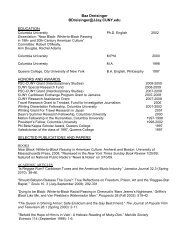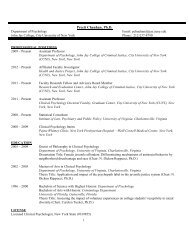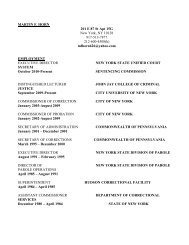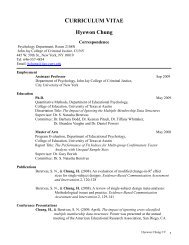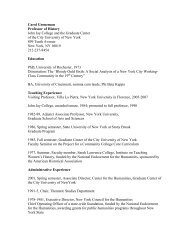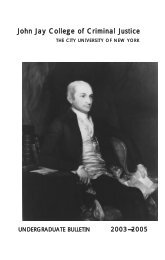Bulletin - John Jay College Of Criminal Justice - CUNY
Bulletin - John Jay College Of Criminal Justice - CUNY
Bulletin - John Jay College Of Criminal Justice - CUNY
You also want an ePaper? Increase the reach of your titles
YUMPU automatically turns print PDFs into web optimized ePapers that Google loves.
Academic Standards<br />
• Taking an examination for another student, or asking or<br />
allowing another student to take an examination for you<br />
• Changing a graded exam and returning it for more credit<br />
• Submitting substantial portions of the same paper to more than<br />
one course without consulting with each instructor<br />
• Preparing answers or writing notes in a blue book (exam<br />
booklet) before an examination<br />
• Allowing others to research and write assigned papers or do<br />
assigned projects, including use of commercial term paper<br />
services<br />
• Giving assistance to acts of academic misconduct/dishonesty<br />
• Fabricating data (all or in part)<br />
• Submitting someone else’s work as your own<br />
• Unauthorized use during an examination of any electronic<br />
devices such as cell phones, palm pilots, computers or other<br />
technologies to retrieve or send information.<br />
Plagiarism is the act of presenting another person’s ideas, research<br />
or writings as your own. The following are some examples of<br />
plagiarism, but by no means is it an exhaustive list:<br />
• Copying another person’s actual words without the use of<br />
quotation marks and footnotes attributing the words to their<br />
source<br />
• Presenting another person’s ideas or theories in your own<br />
words without acknowledging the source<br />
• Using information that is not common knowledge without<br />
acknowledging the sources<br />
• Failing to acknowledge collaborators on homework and<br />
laboratory assignments<br />
Internet plagiarism includes submitting downloaded term papers or<br />
parts of term papers, paraphrasing or copying information from the<br />
Internet without citing the source, and “cutting and pasting” from<br />
various sources without proper attribution.<br />
Obtaining Unfair Advantage is any activity that intentionally or<br />
unintentionally gives a student an unfair advantage in the student’s<br />
academic work over another student. The following are some<br />
examples of obtaining an unfair advantage, but by no means is it an<br />
exhaustive list:<br />
• Stealing, reproducing, circulating or otherwise gaining advance<br />
access to examination materials<br />
• Depriving other students of access to library materials by<br />
stealing, destroying, defacing, or concealing them<br />
• Retaining, using or circulating examination materials, which<br />
clearly indicate that they should be returned at the end of the<br />
exam<br />
• Intentionally obstructing or interfering with another student’s<br />
work<br />
Falsification of Records and <strong>Of</strong>ficial Documents. The following<br />
are some examples of falsification, but by no means is it an<br />
exhaustive list:<br />
• Forging signatures of authorization<br />
• Falsifying information on an official academic record<br />
• Falsifying information on an official document such as a grade<br />
report, letter of permission, drop/add form, I.D. card or other<br />
college document<br />
GRADES<br />
Grades for courses that have been completed during the final<br />
examination are as follows:<br />
Grade Explanation Numerical Value<br />
A Excellent 4.0<br />
A– 3.7<br />
B+ 3.3<br />
B Good 3.0<br />
B– 2.7<br />
C+ 2.3<br />
C Satisfactory 2.0<br />
C– 1.7<br />
D+ 1.3<br />
D Passing 1.0<br />
D– 0.7<br />
F* Failure/Unsuccessful 0.0<br />
Completion of course<br />
P** Pass —<br />
225



